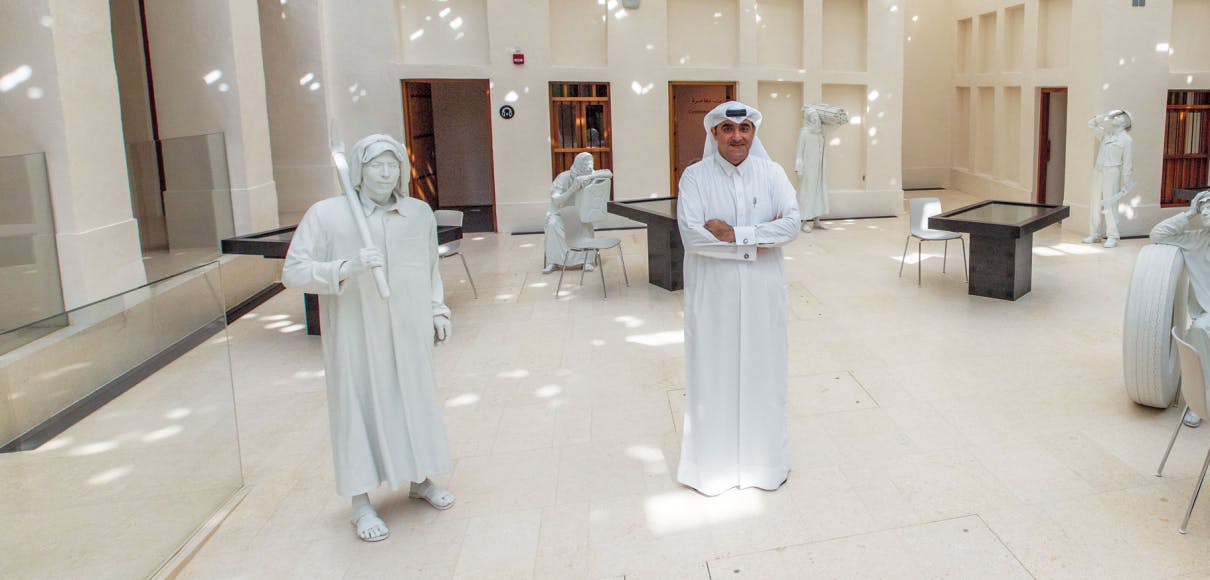In a historical section of Doha, the capital of Qatar, four historic homes have been restored and converted into the Msheireb Museums, a popular destination for schoolchildren, college students, tourists, and locals.
 The director of these museums is Hafiz Ali Abdulla, a film director and producer, as well as a graduate of SPU’s language school partner, the American Cultural Exchange Language Institute.
The director of these museums is Hafiz Ali Abdulla, a film director and producer, as well as a graduate of SPU’s language school partner, the American Cultural Exchange Language Institute.
Hafiz’s enduring connection to Seattle Pacific stretches back more than 20 years, when friends from Oman, Kuwait, the United Arab Emirates, and Qatar told him about the A.C.E. Language Institute at SPU (now called INTERLINK International Institute). “This encouraged me to explore the idea and study at SPU in Seattle,” Hafiz remembered.
The language institute’s affiliation with SPU began in 1976 to help international students learn English and gain cultural skills before enrolling in U.S. universities. “The students from the Middle Eastern countries were enthusiastic and hardworking students,” said Andy Muller, then director of A.C.E. “They appreciated the access to the hospitality and facilities that SPU had to offer, and they contributed to SPU their rich culture, love of life, and desire for a good education.” Hafiz is still in contact with many alumni from the program, staying in touch with them via WhatsApp. “We [have] very good memories of SPU, where the Arab students organized so many cultural and sports activities throughout the year with the support of the University staff,” Hafiz said.
After his studies in Seattle, Hafiz traveled to Southern California, where he earned BFA and MFA degrees in television and film. In his work today, Hafiz has tapped into his filmmaking background to develop a narrative approach for each museum he manages. Together, the four museums provide a comprehensive history of Qatar.
The Radwani House illustrates the evolution of traditional Qatari family life from the early years till the discovery of oil.
The Company House, once headquarters of Qatar’s first oil company, introduces visitors to the men who shepherded in the country’s petroleum industry.
The Bin Jelmood House takes an uncompromising look at slavery throughout the region, and the social, cultural, and economic contributions made by formerly enslaved people.
The Mohammed Bin Jassim House, originally built by the son of the modern Qatar’s founder, details the nation’s challenge to balance 21st century life with preserving local heritage and culture.
Since the museums opened in 2016, more than 700,000 visitors have toured the interactive exhibits. As museum director, Hafiz oversees temporary exhibitions, workshops, conferences, and programs with local and international institutions, and oversees day-to-day operations.
In 2018, the Msheireb Museums won the best educational program award provided by the International Council of Museums Committee for Education and Cultural Action. A museum visitor commented: “I don’t know why we hadn’t visited this place before. I think this is one of the best museums I have ever been to, and we have visited museums all over Europe.”

Qatar, a sovereign Arab state on a small peninsula jutting into the Persian Gulf, is about the size of Connecticut. It was originally part of the Ottoman Empire and then a British protectorate until 1971. Qatar has one of the largest natural gas and oil reserves in the world, but looking into the future, the country is working to build its reputation as a destination for tourists and visitors. Qatar will be the first Arab nation to host the 2022 FIFA World Cup soccer championships. And the Msheireb Museums are part of a major downtown restoration project established by Her Highness Sheikha Moza bint Nasser, the mother of Qatar’s current emir.
Since the museums opened in 2016, more than 700,000 visitors have toured the interactive exhibits, which Hafiz oversees as director of the museums.
“Msheireb Museums are an integral aspect of the inner city’s regeneration of the old commercial center with its traditional community-based lifestyle,” Hafiz said. “Definitely my film background made a difference and supported me in my role to define the narrative approach for the research information and to translate the emotion through films and interactive screens presented in the museum. It is very important for us to humanize the content and give it a voice that speaks to our visitors.”




